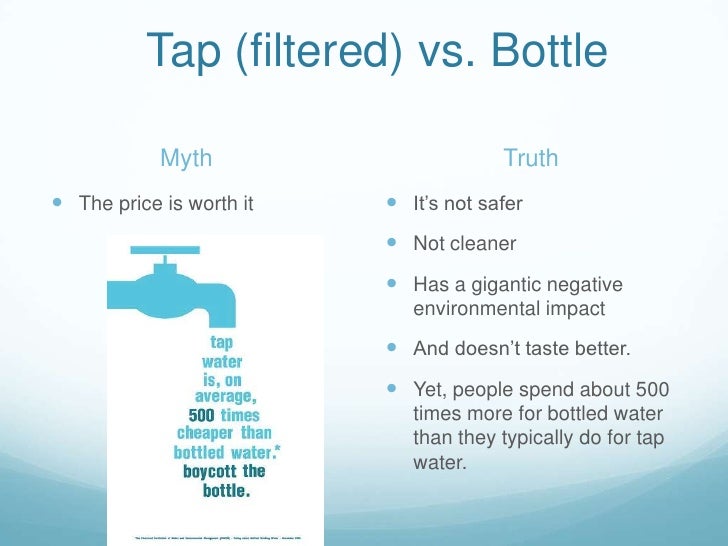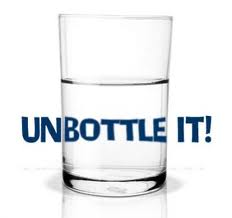http://www.ionizeroasis.com/product_images/uploaded_images/bottled-water-scam2.jpg
WHAT CAN WE DO
http://image.slidesharecdn.com/tapvsbottled-100901022505-phpapp01/95/tap-vs-bottled-water-14-728.jpg?cb=1283326211
- Use a reusable water bottle that can be filled with tap water and refilled when needed
- Drink tap water when you can instead of using a plastic water bottle
- Begin advertising the effects of the overuse of plastic water bottles so people can make informed decisions when they want to buy one
- Encourage water bottle companies to change their plastic and find a product that is better for the environment
- Stop buying plastic water bottles
- Use water fountains and refillable water bottle stations to fill washable drink containers
- Understand the product you are buying before thinking that bottled water is better than tap water
- Keep a filtered water in your fridge and never drink bottled water at home
- Take a refillable bottle with you when you are out and keep hydrated the healthy way
- Ban the use of single use plastic water bottles at sporting events or in schools
- Write letters to water bottle companies encouraging them to change the way they package, produce and transport their water bottles
- Develop better recycling programs so fewer plastic water bottles end up in landfills, oceans, lakes and rivers
Bottled Water and the Economy
How Bottled Water Affects Canada's Human Systems
In most cases bottled water is not any safer than tap water. People believe that they are making a healthier choice when in most cases bottled water can be linked to many negative affects to both the environment and health concerns. The plastic used for bottled water "is
primarily made from PET plastics which are made from hydrocarbon extract made from crude oil" (Bottled Water and Conservation 1). With little regulation in the bottled water industry toxins can go undetected. The bottled water industry makes billions of dollars and is not heavily regulated. It is estimated that 50% of bottled water is actually tap water. (Bottled Water and Conservation 1). It is expensive costing people hundreds to thousands of dollars each year. Over one billion people in the world have no access to clean drinking water and are surrounded by dirty and diseased water. "If one sixth of the 100 billion spent on bottled water world wide was used to help these nations the number of people with no access to clean water could be cut in half" (Goldschein 2). While companies are making huge profits communities are at risk and facing depleted water resources. People need to understand what they are drinking and decide if the cons outnumber the pros when it comes to opening a bottle of water in Canada. Canada's tap water is often a safer and more environmentally friendly choice.
Bottled Water and Canada’s Physical Systems
http://planetsave.com/wp-content/uploads/2014/10/Plastic-bottles-being-landfilled.png
History of the Problem
http://www.consumerreports.org/content/dam/cro/magazine-articles/2012/July/07to11upfrontCRJUL12-water-combo.jpg
"Drinking bottled water has been around since the early 1700’s,
however did not gain popularity until the 1960’s when high-density polyethylene
was introduced and plastic become the preferred choice for bottling water" (Tyson 1). This began the bottled water battle between large soft drink
companies, as drinking water became a cheap and healthy alternative to soft
drinks. The bottled water industry boom began in the early 1980s and has had large
growth ever since. Companies advertised bottled water as cleaner, safer and
more purified than tap water and water was transported from glaciers and
natural springs. "In Canada 8% of bottled water comes from municipal water
supplies, while Coca-Cola and Pepsi, two of the biggest manufacturers of
bottled water and are essentially supplying treated tap water" (Stastna 3). Advertising was successful and consumers continue to believe that drinking water is a healthier choice.
A Local, National, and International Problem
http://salonsolids.com/wp-content/uploads/2015/06/plasticwaste1.jpg
The
bottled water industry is a global issue affecting local, national and international
communities. Bottled water is available in all countries, however successful
recycling is limited and landfills are filling worldwide. There is little evidence
that bottled water is any cleaner or better for you than tap water. In fact
many companies that advertise clean, fresh water are nothing more than local
water and are not free of contaminants at all. "Bottled water companies are draining
glacier water and natural water reserves and this impacts ecosystems worldwide" (Chellaney 2). Bottled water is winning over tap water and pollution
worldwide is a global problem. "Water is being called the "Blue Gold" of the
21st century and fresh water is becoming the most precious natural resource" (Baskind 3). We are lucky that Canada is a country so rich in clean,
natural water sources. "China drank eight
billion litres of water in 2000, and just under 21 billion litres in 2009" (Goldschein 13). Countries that lack clean drinking water also use bottled
water as a safe alternative and bottled water companies have been making huge
profits in these areas. In Canada we have access to drinking water where many
places in the world do not. It is estimated that "globally,
we consume about 190 billion litres a year, and this number continues to grow" (Suzuki 1). These facts alone show that if we do not make changes, we are
heading for a global disaster.
Basic Facts of this Environmental Issue
http://www.truthdig.com/images/cartoonuploads/waterbottle.jpg
Subscribe to:
Comments (Atom)








